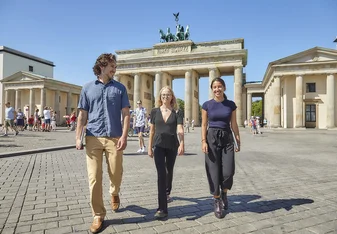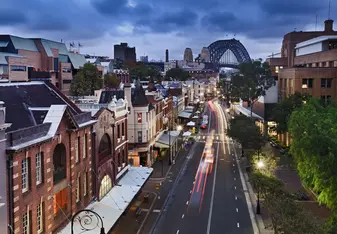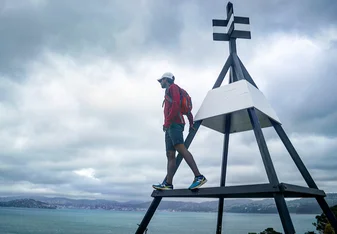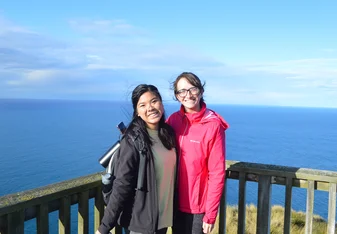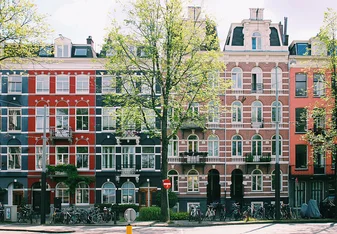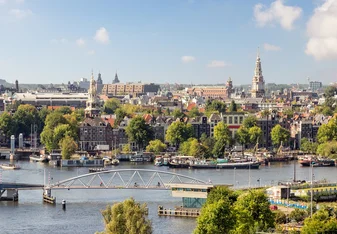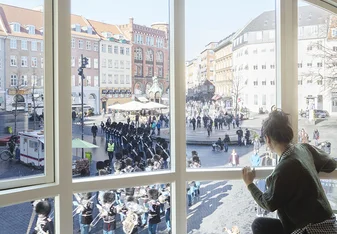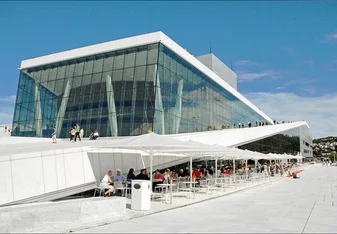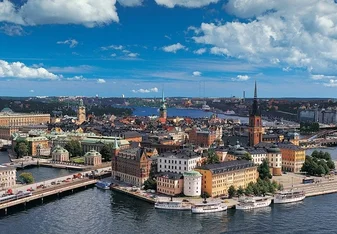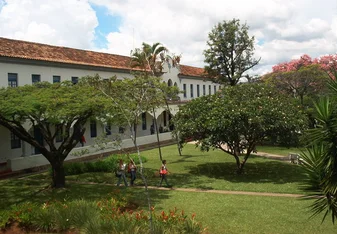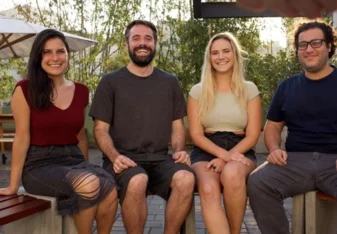10 Accessible Cities for Studying Abroad with Disabilities and Chronic Conditions
As studying abroad becomes a more common part of the college experience, it’s also becoming more accessible for all travelers. Explore 10 accessible study abroad destinations that are taking extra steps to ensure travelers with disabilities have a smooth and positive time overseas!
Key Takeaways 🔑
- Cities, colleges, and courses that are truly committed to supporting students with diverse disabilities are ones that will offer the resources that you need to make sure that you have an equitable experience.
- If a city has hosted any sort of large-scale event (like the Olympics) in the recent past, its likely designed to support travelers with disabilities, as accessibility is usually a major priority!
- Accessibility looks a little bit different to everyone, depending on your type of disability and/or chronic condition.
- Check in with your program advisor as early as possible to see if the university is fully equipped with the resources you'll need, such as wheelchairs, ramps/lifts, and braille textbooks, as well as accessible housing and any other support you may need.

Studying abroad with a disability and/or chronic condition can seem like a great challenge. But, like all good challenges, we folks with chronic conditions and disabilities know how to get over them. All we need is to find the right place that can offer us the resources and support we need to have a safe and successful study abroad.
I know because I myself have studied abroad several times with my chronic conditions and know many amazing folks with disabilities and chronic conditions who have done the same - students with autism, epilepsy, ambulatory issues, and more, who have studied in multiple cities all around the world.
Looking for the best places to take your studies abroad? Look no further, read on for the top 10 accessible cities for studying abroad with disabilities and chronic conditions.
How did we pick these locations?
In compiling this list of locations, we considered the following factors:
- First-person perspectives from travelers with disabilities and chronic conditions who studied and/or traveled to in these places
- Overall attitudes towards disabled travelers and travelers with chronic conditions
- Accessibility resources provided by local universities in the recommended countries
- City infrastructure and accessibility resources
- Research into local laws and regulations
What are some factors to consider when picking a program?

1. Flexibility
Finding a program that offers flexibility for you and your unique needs is just as important as choosing the best place for your study abroad. Inquire directly with program providers about how flexible and supportive they will be with you on a program.
And, ask yourself, how flexible can you be while abroad while keeping yourself safe and healthy?
Communication
Communication is key, especially when it comes to caring for your disability and chronic condition needs. Check to see how clear and communicative your program provider and host institution is when it comes to supporting students with disabilities by checking their website.
And, chat with all support staff from your home university, to your program provider, to your host institution, and more to make sure that everyone is on the same page with providing you the support that you need.
“Collaborate with disability services at your university and your medical team to create a plan while you are abroad”
Resources
Cities, colleges, and courses that are truly committed to supporting students with diverse disabilities are ones that will offer the resources that you need to make sure that you have an equitable experience.
Host institutions that are really committed should list these resources on their website and you should be able to contact their support staff to find more detailed information, too.
“Get special help from school. Students with disabilities should get free [and additional services and resources] when they study abroad”
Accommodations
Pre-departure and on-site accommodations for your needs are a must for all students with disabilities and chronic conditions. Access to accommodations should be information readily available by your host institution and/or program provider.
Ask about your access to accommodations directly with your program provider and/or host institution support staff.
“Depending on where you study abroad, you might find certain accommodations more accessible than at home.”
Accessibility
Accessibility looks a little bit different to everyone, depending on your type of disability and/or chronic condition.
Look into the accessibility of the resources and support systems that you need and inquire with support staff to see if they’re available to you.
1. Berlin, Germany: Creating a barrier free city

Berlin won the 2013 Access City Award for working towards creating a barrier free city by offering transportation, infrastructure, and public spaces that are accessible for people with diverse disabilities.
Germany’s Tourism for All program even offers a free app called AccessBerlin, where visitors can find information about accessible venues for folks of diverse disabilities. They even offer a phone number you can call to answer your particular questions.
The Freie Universität Berlin European Studies Program (FU-BEST program) is committed to supporting diverse students with disabilities and encourages prospective participants to get into contact with their office so that they can assist them. They even offer a whole webpage on studying with disabilities and chronic diseases, too.
Recommended programs
2. Sydney, Australia: Inclusive tourism for all

Sydney, Australia is a disability-friendly city, especially with wheelchair accessible buildings, sidewalks, housing, and transportation. This is due to the country’s hosting of the 2000 Summer Olympics, a global event that prioritizes renovating the hosting city to create more accessibility for tourists of diverse abilities and disabilities.
The country’s 1992 Disability Discrimination Act has set the standard for making sure that Sydney and all other cities are inclusive of and accessible for all people with disabilities.
The city’s program, Sydney for All, offers guides, information, and resources for people of diverse disabilities. The program’s website let’s visitors know what kind of accessibility popular locations offer for people who have mobile, visual, and auditory disabilities.
In the tourism industry, transportation, tours, and hotels must provide additional support services for travelers with disabilities, such as offering wheelchairs, oxygen and facilities for guide dogs, or devices for those with visual or aural impairments.
In addition, many of the beaches in Australia have laid out matting for wheelchair access.
Studying abroad in Sydney sounds like an awesome opportunity for an accessible experience for all, but especially those who need mobile accommodations and wheelchair access.
Recommended programs
3. Christchurch and Palmerston North, New Zealand: Safe navigation

While New Zealand is known for being a rugged and adventure-activity-filled country, they're also a leader in encouraging inclusive tourism for all. Like Australia, they have legislation in place requiring their schools' amenities and facilities to be accessible and inclusive for all.
Christchurch is the 3rd largest city in New Zealand and has set an example for the world on how to make the streets more accessible for people with vision impairment and more safe for all.
The city also offers resources such as an interactive accessibility map, which helps users find disability-friendly bathrooms, parking, scooters, and places that offer hearing loops for folks who use a hearing aid.
Palmerston North is regarded as the best city for people with disabilities to live in New Zealand. This city is known for having a higher-than-average population of disabled residents and accommodations such as local services like disability-friendly hospitals and resources like motor scooters, to meet their needs.
It is a city with flat land, which makes it a great study abroad destination for students with mobile disabilities. Though, the city is great and welcoming for people of all diverse disabilities.
Plus, many of its beautiful national parks beaches utilize wheelchair-accessible mats and tracking. There are even wheelchair-focused tour companies that will help you explore this wonderful country as you study abroad.
Recommended programs
4. Amsterdam, The Netherlands: Rich with accessible resources

The Netherlands’ 2003 Act of Equal Treatment sets the standard for equitable treatment of people with (physical and mental) disabilities and chronic conditions, which means that institutions like universities and public entities must accommodate the needs of their guests.
The University of Amsterdam has a webpage on their website dedicated to students with disabilities or chronic illnesses, which offers information and resources for students with diverse disabilities. This is a helpful way for students to prepare and research what resources will be readily available to them when they get there!
“Services for People with Disabilities in Amsterdam" is rich with resources and information on transportation in the city, which they claim to be complicated, due to the narrow, cobblestoned streets. However, the city does offer accessible attractions, which you can find on Amsterdam Wheelchair Accessible.
While Amsterdam might not be greatly accessible for people with mobility issues, it could be a great choice for students with other disabilities and chronic conditions.
Recommended Programs
5. Copenhagen, Denmark: Inclusive of all folks with disabilities

The city of Copenhagen offers public transportation which is accessible to people of diverse disabilities and mobile conditions. It is a city dedicated to making sure that people with disabilities are treated no differently from others and are included in everyday day-to-day Danish life.
DIS Copenhagen is a non-profit organization that offers an abundance of resources for students with disabilities who want to study abroad in the city. Their website offers a resource guide for requesting accommodations along with a host of other disability resources.
A deaf student shares about her successful study abroad experience at the University of Copenhagen. She qualified for Special Education Support Funding from the Danish government, which helped cover the costs of interpretation needs while abroad.
So, if you have a disability and you need additional support and accommodations while abroad, Copenhagen sounds like a great place to be!
Recommended Programs
6. Singapore: Supports diverse disabilities and special needs

Singapore has long emphasized accessibility in its building codes, with a barrier-free building policy since 1990, cultivating flat roads and accessibly entry ways, as well as upgrading old buildings.
The country hosts their Mass Rapid Transit (MRT) system, which is renowned as one of the most accessible transportation systems around the world. All of the MRT stations have wide fair gates for wheelchair access, at least one barrier-free route, braille plates in elevators, tactile paving, and ramps and lifts.
In addition, Singapore residents with disabilities can qualify for a card that they can tap at crossroads, granting them extra time to cross the street. This feature can be especially helpful for folks with mobile, visual, and physical disabilities.
The National University of Singapore offers a curriculum in English and has a Student Accessibility Unit, which provides support to students of diverse disabilities and special needs.
Studying abroad in sunny, tropical Singapore sounds like a dream for students with disabilities to me!
Recommended Programs
7. Oslo, Norway: Great resources for those with mobility disabilities

Oslo, an already pretty accessible city, is on its way to becoming one that is universally designed to meet the needs of all people with diverse disabilities by 2025. The city is making information, communication, and technology accessible online and in person, along with ensuring that public buildings and infrastructure are readily accessible to all.
The city centre is also a pedestrian zone with limited parking reserved only for drivers with disabilities and emergency vehicles. This means less vehicle traffic and more accessibility for all people, particularly those with mobility disabilities.
The University of Oslo offers a special webpage dedicated to special needs and accommodations for international students. One student who has low vision impairment and uses a cane, shares how she had a wonderful experience working with university staff in Oslo to get the accommodations and support that she needed.
Oslo sounds like a city offering a smoother experience for students with disabilities and I would highly recommend taking up the opportunity!
Recommended Programs
8. Stockholm, Sweden: Helpful databases for students

Stockholm is a city dedicated to serving people with disabilities by making their transportation, public buildings, and other infrastructure accessible. Sweden has its very own Accessibility Database, where users can search for different locations, services, and stores along with the type of accessibility and accommodations that they offer.
STIL, the Stockholm Cooperative for Independent Living, gives a detailed breakdown of all the available services for people with disabilities, from transportation and assistive devices, to assessing needs and requesting personal assistance.
Stockholm University supports all students with disabilities with the goal of giving all students equal opportunity.
Stockholm sounds like an accessible place for students with diverse disabilities to be.
Recommended Programs
9. Tokyo, Japan: The future for travelers with disabilities

In recent years, Japan has prioritized making their cities and buildings as "barrier-free" as possible.
To help travelers with disabilities, ramps can normally be found at many tourist attractions. However, older sites, such as shrines and temples, that were built on top of stairways and hills have had trouble adapting to Japan's accessibility standards.
Japan's transportation systems have undergone massive improvements and continue to be updated with changes. Some changes include escalators carrying wheelchairs, tactile paths to help the visually impaired, and JapanTaxis which can seat wheelchair users.
It's also not a surprise that a country so famous for its toilets also has accessible bathrooms as well -- at least in the major cities.
"This may sound strange, but there might be other pleasant surprises when going abroad. From my experience, while I did struggle with how outgoing everyone was in Argentina, I was able to get used to it. I also found it freeing when I went to work in Japan and I didn't have to work on maintaining direct eye contact all of the time."
Recommended Programs
10. Rio de Janeiro, Brazil: Innovative tourism for travelers with disabilities

Rio de Janeiro hosted the 2016 Summer Olympics and Paralympics (Olympics for athletes with disabilities) and renovated major attractions to make them more accessible to all. Access to the city’s airport, malls, and other major attractions like Copacabana beach, were rebuilt with visitors with disabilities in mind.
But even before then, you could take cable cars to major attractions located on mountains, like the famous Pão de Açúcar and other attractions like Corcovado where you can see the giant statue of Christ the Redeemer.
Locals with disabilities in Rio express their love for their city in an investigative BBC News report. Though, others report their struggles with having a disability living in the city in this pre-Olympic NPR report. While many roads were renovated and streets made more accessible, most streets are not easily navigable for people with wheelchairs, or who are visually impaired.
I studied abroad in Brazil with UCEAP while the city was preparing for the summer olympics and from what I saw, progress was off to a good start. And, I will always remember how my program brought in a therapist to chat with us about mental health and offer her resources to us if needed.
All said, I think that Brazil could be a good place for folks with disabilities to study abroad, but it’s always important to check in with your program provider and host university about how they can best help and accommodate you, first.
Recommended Programs
separator_solidReady to study abroad?
From Tokyo, Japan to Sydney, Stockholm, and beyond, you have some great options to weigh when it comes to choosing your next study abroad destination. Just one thing to keep in mind: wherever you go, be sure to pick the place that will best serve you and your needs and you’ll be in for a wonderful experience abroad, regardless of your disability or chronic condition.
Read more: 7 Tips for Studying Abroad with Disabilities and Chronic Conditions



